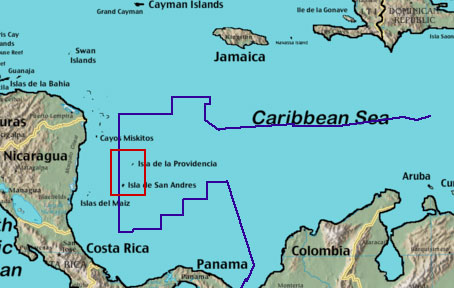The International Court of Justice (ICJ) ruled on a crucial decision on a territorial conflict between Colombia and Nicaragua.
The (ICJ) decided on Wednesday that Nicaragua cannot extend its continental shelf beyond the 200 nautical miles that delimit its maritime border with Colombia.
Nicaragua seeks to extend its continental shelf beyond the internationally recognized 200-nautical mile limit, an area known for its valuable natural resources.
Nicaragua initiated legal proceedings in 2013, claiming rights to the seabed and subsoil in the Caribbean beyond the 200-mile limit.

However, this would overlap with Colombia’s continental shelf in the San Andres, Providencia, and Santa Catalina archipelago.
In a previous ruling in 2012, the ICJ confirmed Colombia’s sovereignty over the islands but granted Nicaragua an expanded maritime zone.
The upcoming ruling will determine if Nicaragua’s claim is accepted or rejected by the ICJ.
It has significant implications for the disputed maritime area, known for its abundant natural resources and fisheries.
The court had to address two main issues.
Whether customary international law provides criteria for extending the continental shelf beyond 200 miles, and if one state’s extended continental shelf can overlap with another state’s 200-mile limit.
Nicaragua argues that both customary law and the UN Convention on the Law of the Sea support its claim.
Colombia, which has not ratified the Convention, asserts that Nicaragua has not provided sufficient scientific evidence to prove the existence of an extended continental shelf.
This long-standing dispute over valuable maritime areas, rich in biodiversity, fishing resources, gas, and oil, dates back to 1928.
The 2012 ICJ ruling granted Nicaragua a region in the Caribbean Sea while affirming Colombia’s sovereignty over the archipelago, resulting in Colombian islands surrounded by Nicaraguan territorial waters and escalating tensions.
Colombia responded to the 2012 ruling by withdrawing from the Pact of Bogotá, which recognized the ICJ’s jurisdiction in such disputes.
In 2013, Nicaragua filed another lawsuit against Colombia, accusing it of violating maritime spaces.
Colombia filed a counterclaim, emphasizing the impact on the Raizal population, who depend on artisanal fishing in the disputed territories.
In April 2022, the court ruled that Colombia had violated Nicaragua’s sovereign and jurisdictional rights.

